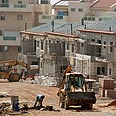
Face of our country. Construction resumes in Ariel
צילום: AFP
Israel’s settlement folly
Op-ed: Settlement enterprise a tragic example of state acting against its own interests
Folly is defined as extreme foolishness and a dramatic display of senselessness. In the national theater, folly is an ongoing act undertaken by a state that wholly contradicts its own interests. A renowned Jewish historian achieved eternal glory for diagnosing this odd phenomenon.
In her celebrated book, The March of Folly, Barbara Tuchman identified three fundamental conditions for joining this dubious club: The results of the folly must be clearly evident while it’s still ongoing, and not just in retrospect; alongside the folly there must be a sane alternative; and the folly must be the declared policy of a group, rather than that of one ruler, and must go on for more than a generation.
Tuchman dedicated most of her work to two blatant examples: The clash between Britain and its American colonies in the 18th Century, and America’s sinking into the Vietnamese swamp in the second half of the 20th Century. I have no doubt that had she been alive today, she would add a chapter to her book about Israel’s settlement enterprise in the occupied territories.
The settlements contradict Israel’s interest because they make it more difficult to partition the land, thereby threatening the continued existence of the Zionist enterprise. They also force Israel to maintain a military occupation rule, push it into international isolation, and greatly enhance Arab and global animosity towards Israelis and Jews.
Yet despite this, Israeli governments for two generations now have continued to insist on the existence of settlements and pour immense resources into them. The settlements are our folly. There is great symbolism in the fact that at this time too, the fate of the diplomatic process will be determined by settlement construction, rather than security arrangements, the return of refugees, or sovereignty in Jerusalem.
Most Israelis unconvinced
I flew above the settlements recently, courtesy of a flight arranged by the Peace Now movement. I am well familiar with the territory, yet the bird’s eye view reinforced the old story. Here are the red roofs and blue swimming pools, stuck like a thorn in the side of crowded, grey Palestinian communities, while branching out via white caravans in the framework of 95 illegal outposts.
Also prominent were the construction initiatives waiting for the end of the freeze – thousands of potential housing units, the vast majority of which are earmarked for anti-Zionist haredim who only care about cheap housing courtesy of the government.
I also observed the spacious highways built through the West Bank by the government. They were empty. The settlements may have succeeded in settling in political circles, but not in the hearts or feet of the people: Only 300,000 Israelis chose to live beyond the Green Line so far. The other Israelis barely travel to Judea and Samaria, or to the Jordan Rift Valley. They barely know the area.
When the recent debate about the Ariel theater boycott emerged, it turned out that most Israelis have no idea how far Ariel is from the Green Line, and that insisting on keeping it within Israeli territory in the framework of a final-status agreement would thwart a peace deal, or at least prompt a borderline that is unreasonable in security and geographical terms.
This, of course, does not prevent the government from establishing a new industrial zone in Ariel at this time, while subsidizing a college and a high-tech zone in the city. Over the holidays, I met a young, bright high-tech entrepreneur who intends to move his startup to Ariel. “I couldn’t get such terms anywhere else,” he said with sadness. I looked at his defeated face, and I saw the face of our country.
The only thing I wanted to do at that moment was to cry out to the skies two words, in line with Jewish tradition in the face of a foreign element that invades a normal body and prompts it to behave in a wholly senseless manner: Out, Dybbuk!
- Follow Ynetnews on Facebook










